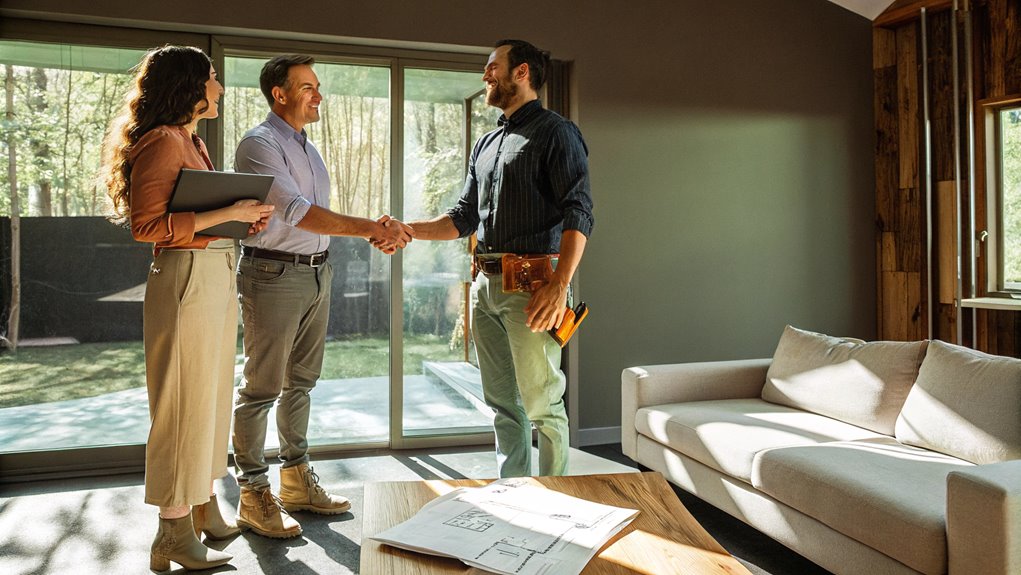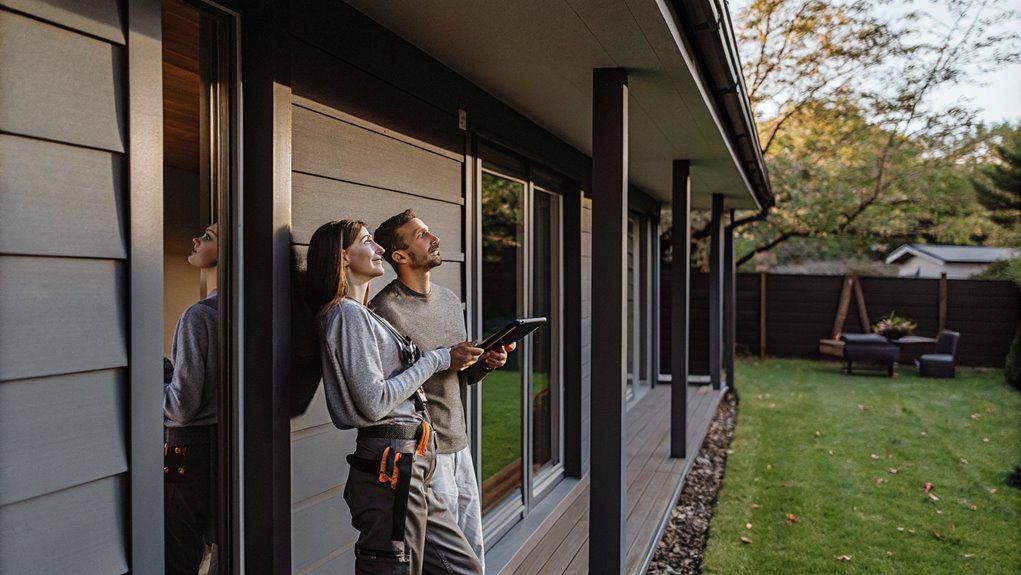When you buy a new home, you need to get ready for things that might break. First, save money in a special bank account. Try to save enough to cover 3-6 months of bills. Also, save 1-3% of what your home is worth each year.
Make a list of things to check in your home. Look at your heating, cooling, and pipes often. Fix small problems before they get big. Keep tools at home to fix easy things yourself.
But some fixes need experts. Keep phone numbers for good repair people you can trust. You might want to buy a home warranty too. This can help pay for fixes in your first year.
If you do these things, you won't panic when something breaks. You'll have the money and help you need to fix it fast.
Build Your Emergency Fund

Bad things happen, and you need money saved up for them. As a homeowner, you need enough money to cover 3-6 months of bills.
First, add up what you spend each month:
- Your house payment
- Power and water bills
- House insurance
- Taxes
- Food and basic needs
Take that number and times it by 6. This is how much you should save.
Set up your bank to move money each month from your checking to a savings account that pays good interest.
Try to save 10% of what you bring home in pay. When you get extra money, like tax money back, put half of it in savings.
Keep this money away from your other savings. This is your safety money for when life gets hard and you still need to pay for your house.
Common First-Year Home Repairs
When you first buy a home, you'll need to fix some things.
Even if your home passed the check-up, small problems pop up. You might see water drips from your sink or toilet. Your pipes might leak too. The big machine that keeps your home warm or cool needs care, like new air filters.
Your garage door might stop working right. Doors mightn't close well, and windows can get stuck. Cold air might sneak in through gaps around doors and windows.
You might see loose parts in your bathroom, like tiles or the soft seal around your tub. Light switches and wall plugs can break and need fixing.
Outside your home, leaves can fill up your rain pipes. The seal around windows can crack. The stones in your walkway might sink into the ground.
If you fix these small things fast, they won't turn into big problems.
Finding Reliable Local Contractors

Need someone to fix your home? Let's help you find a good worker.
Ask your neighbors who they trust to do repairs. They know who does good work in your area.
Look up what other people say about workers online. Make sure the worker has a license and can fix what's broken.
Get the price in writing before they start. Check if they've insurance too.
It's best to talk to a few workers and pick the one you trust most.
Research Multiple Service Providers
You need good helpers ready before things break at home.
Look for at least three people who can fix each thing in your house. This means finding people who can fix:
- pipes
- power
- heating and cooling
- home repairs
Ask your friends who they trust to fix things. Talk to people who live near you too.
When you find someone good, call them. Ask how they can help with your home.
Make a simple list with:
- their name
- phone number
- what they fix
- how much they cost
- how fast they come when you call
Write all this down and keep it where you can find it fast.
This way, when something breaks, you know who to call right away.
Ask Neighbors for Recommendations
Your neighbors can help you find good people to fix your home. They know who did good work for them. You can talk to them when you see them outside or at local events.
When you talk to your neighbors, tell them what you need fixed. Ask them who helped them with their homes. Find out how long the work took and if the price was fair. Ask if they'd any problems with the work. Try to get names from more than one neighbor.
After you get names from your neighbors, look up what other people say about these workers online. Make sure they've the right papers to do the work.
Workers who fix homes near you want to keep doing a good job so people will like them.
Follow Proper Vetting Procedures
Hiring someone to work on your home takes care.
Let's make sure you pick the right person.
Ask to see their state license. Make sure it's still good. Your local board can tell you this.
Check if they've two types of safety plans. One keeps your home safe. One keeps their workers safe.
Call three people who used them in the past year. Ask how they did on the job.
Look at what others say about them online. See their BBB grade too.
Get their plans in writing. The plans should list what they'll do, what they'll use, when they'll finish, and how much it costs.
Make sure you know where their shop is.
Ask if they'll get the right papers from the city to do your work.
DIY Vs Professional Repairs
Making home fixes yourself or calling a pro is a big choice. First, think about what you know how to do. Have you done this kind of fix before? Some jobs are easy to do on your own. Others need special tools or skills.
Look at the costs. Add up what you'd spend on tools and stuff to fix it. Then check how much a pro would charge. Think about how long it will take you too.
Most important: stay safe! Some jobs are too risky to try alone. If the job needs wiring work, changes to walls, or big pipe fixes, call a pro. Better safe than sorry!
Know Your Skill Level
You need to know what you can fix in your home. Think about what you know how to do before you start any work.
Simple Jobs:
If you're new to fixing things, start small:
- Paint walls
- Change air filters
- Clear clogged sinks
Medium Jobs:
If you have some know-how:
- Put in new sink taps
- Fix holes in walls
- Build basic things with wood
Big Jobs:
If you know a lot about home fixes:
- Put up new lights
- Put in new toilets
- Lay down tiles
Some jobs are too hard or risky to do on your own. Get help from a pro when:
- Working with power lines
- Fixing gas pipes
- Working on the roof
- Changing how your house stands
Start with easy fixes. Learn more as you go. If a job feels too big, call someone who knows how to do it right. This keeps you safe and saves money in the long run.
Cost-Benefit Analysis
When you need to fix something, think about doing it yourself or calling someone to help.
Here are the things to think about:
Time: How long will it take you to learn and do the job? Think about what your time is worth.
Tools: Do you need to buy tools? If you'll use them a lot, buying them is good. If you only need them once, you might want to rent them or let a worker bring their own.
Risk: Some jobs can be tricky. A water pipe fix gone wrong could hurt your home and cost a lot to clean up.
Workers who fix things for a living know what they're doing and promise their work will be good.
Always pick the choice that will save you money and keep you safe.
Safety First Considerations
Think about staying safe before you start any home fix-up job. Take a good look at what you can do. Be honest with yourself. Never try to fix wiring, gas pipes, or walls unless you have the right papers that say you can.
Be very careful when you need to work up high, use power tools, or deal with things that can hurt you. If you don't know how to stay safe or don't have gear to protect yourself, call someone who fixes homes for a living.
Many jobs need special papers from the city. Your house insurance mightn't help you if you get hurt doing the work yourself.
You can do small jobs on your own if you learn how first. Paint a room. Put new handles on your kitchen cabinets. Fix a dripping sink. These are OK to try if you have the right tools.
Essential Tools and Supplies

Your home needs tools to fix things when they break. You want a tool box with these items:
- screwdrivers (flat and star-shaped)
- wrenches you can adjust
- pliers to grip things
- hammer
- tape to measure
- level to make things straight
- knife for cutting
- tool to check if wires have power
- tape for water pipes
Keep these supplies in a cabinet for when you need them:
- strong gray tape
- spray oil
- glue for wood
- white stuff to fill gaps
- new light bulbs
- batteries
You also need small parts like screws, nails, and washers.
For toilet and sink problems, keep a plunger and pipe tools close by.
Put all these things where you can find them fast when something breaks.
Home Warranty Considerations
Getting a home warranty helps protect you when things break in your new home. Think of it as a safety net for your first year. You pay a small fee now to avoid big bills later.
Most basic plans help fix your:
- Air and heat
- Water pipes
- Power systems
You can pay more to cover:
- Kitchen tools like your fridge
- Other home items you want to protect
Before you pick a plan:
- Look up companies online
- See what other people say about them
- Check how much they charge to send help
- Learn how fast they come when you call
Ask if you can pick who fixes your home or if you must use their repair people.
Take time to read what the plan covers and what it does not. This helps you know what to expect when you need help.
Seasonal Maintenance Checklist

Your home needs care just like you do. Think of it as giving your house a check-up four times a year. Make a list and stick to it.
Each month, look at your air filters. Every three months, check your roof. Twice a year, test your smoke alarms.
In spring, you need to:
- Clean leaves from gutters
- Look for winter damage
- Check for cracks in walls
In summer, you need to:
- Get your AC ready
- Fix up your deck
- Check window seals
In fall, you need to:
- Make sure your heater works
- Clean your chimney
- Seal up door gaps
In winter, you need to:
- Stop ice from building up
- Keep pipes warm
- Watch how air moves in your attic
Write down when you do each job. Add tasks that fit your home's special needs.
Budgeting for Home Repairs
Keeping your home in good shape means putting money aside for fixes. Think of it like a piggy bank for your house! You should save some money each year – about $1-3 for every $100 your house is worth. If your house cost $300,000, you'd need to save $3,000 to $9,000.
Split your house money into three parts:
Big Problems (40%):
Keep this money easy to get when things break fast, like a leaky roof or broken heater.
Regular Upkeep (35%):
This money helps you take care of small fixes before they turn into big ones.
Making Things Better (25%):
Use this money to make your home nicer, like new paint or better lights.
Keep your emergency money in a bank where you can get it fast. The other money can go in a bank account that gives you extra money for saving it there.
Preventive Maintenance Strategies

Taking care of your home helps it last longer and saves you money. Make a simple list of things to check and fix each month and year. Look at your roof, gutters, heating, cooling, and basement walls often to catch problems early.
Remember the easy stuff too. Put in new air filters every few months. Test your smoke alarms four times a year. Clean out your water heater once a year. Write down when you do these jobs in a notebook.
Ask other people who live nearby about how they take care of their homes. They can tell you about good repair workers in your area.
When you take care of your home, you join other smart homeowners who do the same.







